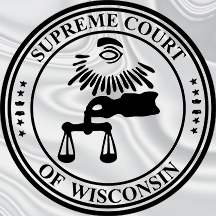Or interesting stuff we couldn't get to otherwise. Coming to you (mostly) straight from the documents themselves!
You can now subscribe to updates from Appealing Wisconsin! Click on the "Subscribe" tab at the top of the page to receive email updates when a new blog post is published!
Petition for Review
Case no: 23AP76
Case name: Richard Braun v Vote.org
Court of Appeals District: II
Panel: Shelley Grogan, Maria Lazar, Lisa Neubauer
Opinion author: Grogan
Filing attorney: Diane Welsh
Law firm / agency: Pines Bach
Filing attorneys: David Fox, Samuel Ward-Packard
Law firm / agency: Elias Law Group
Circuit Court: Waukesha County
Judge: Michael Maxwell
Statement of issues presented
Plaintiff Richard Braun sued the Wisconsin Elections Commission, challenging the longstanding approval of the National Voter Registration Form. Vote.org, a nonpartisan voter registration organization that has for years relied on Wisconsin’s acceptance of the National Form to register Wisconsin voters, moved to intervene as of right.
The Waukesha County Circuit Court denied the motion to intervene, holding that the Commission adequately represented Vote.org’s interest in the case because it sought the same litigation outcome as the Commission. The circuit court later granted summary judgment to Braun, enjoining use of the National Form in Wisconsin. The Commission elected not to appeal that decision.
Vote.org appealed the denial of intervention, arguing that the Commission did not adequately represent its interests in two respects. First, unlike the Commission, Vote.org has a concrete financial and organizational stake in continuing to use the National Form in Wisconsin. Second, unlike the Commission, Vote.org would have appealed the grant of summary judgment.
The court of appeals, district II, affirmed the denial of intervention based entirely on adequacy of representation. The panel majority reasoned that the Commission and Vote.org had “the same ultimate objective” in the litigation, which it took to mean that Vote.org was adequately represented.
Judge Neubauer dissented. She would have held Vote.org’s interests to be inadequately represented on both grounds Vote.org pressed on appeal. First, adequacy of representation depends on interests, not litigation objectives, and the Commission — a government agency— cannot adequately represent Vote.org’s unique private interests. Second, even with respect to litigation objectives, the Commission’s failure to appeal the adverse merits decision rendered it an inadequate representative.
The issues presented for review are:
(1) Whether a named defendant adequately represents a would-be intervenor just because the defendant shares the intervenor’s litigation objectives, despite different fundamental interests.
(2) Whether a named defendant adequately represents a would-be intervenor where the intervenor would appeal an adverse merits decision that the defendant did not appeal.
Brief of Appellant
Case no: 24AP994
Court of Appeals District: II
Filing attorney: Michelle Martin, Zachariah Sibley
Law firm / agency: Axley law firm
Circuit Court: Winnebago County
Judge: Daniel Bissett
Statement of the case
In 2017, the City adopted a Tourist Housing Ordinance. ... The ordinance requires any tourist housing property to first receive a permit from the City, which will be granted only on the condition that the “tourist rental property shall be the primary residence of the applicant.”
Also in 2017, the Wisconsin Legislature enacted Wis. Stat. § 66.1014. Entitled “Limits on residential dwelling rental prohibited,” § 66.1014 withdraws and preempts municipal authority by prohibiting certain municipal regulations or conditions on private residential dwelling rentals. ...
As relevant to this appeal, the circuit court concluded on summary judgment that the ordinance’s “primary residence” limitation on residential dwelling rentals neither violated nor was preempted by § 66.1014.
Argument
The Ordinance’s “primary residence” limit on private rentals of residential dwellings is unlawful. The Court should hold as much for either one of two alternative reasons. First, the Ordinance’s “primary residence” limitation falls squarely within § 66.1014’s express prohibition against such limitations. Alternatively, § 66.1014 preempts municipal ordinances, such as the Ordinance, that attempt to limit citizens’ ability to rent their residential dwellings in this manner. Both alternative avenues to the same result are addressed in turn.
The law's
plain text prohibits the ordinances municipalities may enact to limit residential dwelling rentals. The definition of a “residential dwelling” ... is broad: it covers “any building, structure, or part of the building or structure, that is used or intended to be used as a home, residence, or sleeping place by one person or by 2 or more persons maintaining a common household, to the exclusion of all others.” The legislature’s chosen language demonstrates that it means to expansively prohibit municipal limitations on renting residential dwellings well beyond those being used as a primary residence.
Another part of the statute says
“a political subdivision may not enact or enforce an ordinance that prohibits the rental of a residential dwelling for 7 consecutive days or longer.” This provision therefore: (1) regulates political subdivisions, including the City here; (2) bars the City from enacting or enforcing an ordinance that attempts to prohibit private rentals; and (3) protects all homeowners who rent a “residential dwelling for 7 consecutive days or longer.”
The law plainly protects the right of any renter who makes any residence rentable for a week or longer to rent out that dwelling, regardless of whether it is the renter’s primary residence or not. A municipality may neither enact nor enforce any ordinance limiting that short-term rental right.
***
The ordinance’s class-based, categorical exclusion from the permit of non-primary residents denies a vast number of properties — properties owned by a corporation, a limited liability company, or a trust, for example — from exercising the basic property right that § 66.1014 expressly protects: renting a residential dwelling. The ordinance therefore unequally denies certain homeowners their full property rights within the City in ways they would not be denied elsewhere in Wisconsin.


Comments